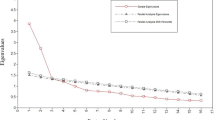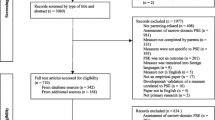Abstract
One of the most frequently used measures to assess parents’ assessment of their parenting ability is the Parenting Sense of Competence (PSOC) Scale. However, there is limited psychometric evaluation of the measure with samples of mothers of infants. This paper examines the psychometric properties of the PSOC in a heterogeneous sample of mothers of infants between the ages of 2 and 12 months of age. To capture a diverse sample, data were obtained from two studies of mothers of infants. All participants (n = 218) completed the 17-item PSOC at one time point during the postpartum period along with information about maternal age and education. Additional measures for the purpose of examining convergent validity assessed mothers’ self-esteem, depressive symptoms, and social support. The characteristics of the mothers differed significantly between the two subsamples except for their PSOC scores. Despite these differences, within each subsample the PSOC total and subscale scores were internally consistent and significantly, moderately correlated with the three psychosocial measures confirming the PSOC’s construct validity when administered to mothers of infants. Future studies should continue to evaluate the psychometric properties of the PSOC with varied samples of mothers as well as fathers.
Similar content being viewed by others
References
Bandura, A. (1997). Self-efficacy: The exercise of control. New York: W. H. Freeman and Company.
Beck, A. T., Ward, C. H., Mendelson, M. M., Mock, J. J., & Erbaugh, J. J. (1961). An inventory for measuring depression. Archives of General Psychiatry, 4(6), 561–571. doi:10.1001/archpsyc.1961.01710120031004.
Breslau, N. (1985). Depressive symptoms, major depression, and generalized anxiety: A comparison of self-reports on CES-D and results from diagnostic interviews. Psychiatry Research, 15(3), 219–229. doi:10.1016/0165-1781(85)90079-4.
Broadhead, W. E., Gehlbach, S. H., de Gruy, F. V., & Berton, H. K. (1988). The Duke-UNC Functional Social Support Questionnaire: Measurement of social support in family medicine patients. Medical Care, 26(7), 709–723.
Bugental, D. B., Johnston, C., New, M., & Silvester, J. (1998). Measuring parental attributions: Conceptual and methodological issues. Journal of Family Psychology, 12(4), 459–480. doi:10.1037/0893-3200.12.4.459.
Cohler, B. J., Weiss, J. L., & Grunebaum, H. U. (1970). Child-care attitudes and emotional disturbance among mothers of young children. Genetic Psychology Monographs, 82(1), 3–47.
Coleman, P. K., & Karraker, K. H. (2000). Parenting self-efficacy among mothers of school-age children: Conceptualization, measurement, and correlates. Family Relations, 49(1), 13–24. doi:10.1111/j.1741-3729.2000.00013.x.
Cooklin, A. R., Giallo, R., & Rose, N. (2012). Parental fatigue and parenting practices during early childhood: An Australian community survey. Child: Care, Health and Development, 38(5), 654–664. doi:10.1111/j.1365-2214.2011.01333.x.
Cox, J. E., Buman, M., Valenzuela, J., Joseph, N. P., Mitchell, A., & Woods, E. R. (2008). Depression, parenting attributes, and social support among adolescent mothers attending a teen tot program. Journal of Pediatric and Adolescent Gynecology, 21(5), 275–281. doi:10.1016/j.jpag.2008.02.002.
Crandall, R. (1973). The measurement of self-esteem and related constructs. In J. P. Robinson & P. R. Shaver (Eds.), Measures of social psychological attitudes (Revised ed.). Ann Arbor: Institute of Social Research, The University of Michigan.
Crowne, D. P., & Marlow, D. (1960). A new scale of social desirability independent of psychopathology. Journal of Consulting Psychology, 24(4), 349–354. doi:10.1037/h0047358.
DeLongis, A., Coyne, J. C., Dakof, G., Folkman, S., & Lazarus, R. S. (1982). Relationship of daily hassels, uplifts, and major life events to health status. Health Psychology, 1(2), 119–136. doi:10.1037/0278-6133.1.2.119.
Dunn, W., Cox, J., Foster, L., Mische-Lawson, L., & Tanquary, J. (2012). Impact of a contextual intervention on child participation and parent competence among children with autism spectrum disorders: A pretest-posttest repeated-measures design. American Journal of Occupational Therapy, 66(5), 520–528. doi:10.5014/ajot.2012.004119.
Gibaud-Wallston, J. (1977). Self-esteem and situational stress factors related to sense of competence in new parents. (Unpublished doctoral dissertation). Nashville: Vanderbilt University.
Gilmore, L., & Cuskelly, M. (2009). Factor structure of the Parenting Sense of Competence Scale using a normative sample. Child: Care, Health and Development, 35(1), 48–55. doi:10.1111/j.1365-2214.2008.00867.
Hall, L. A. (1990). Prevalence and correlates of depressive symptoms in mothers of young children. Public Health Nursing, 7(2), 71–79. doi:10.1111/j.1525-1446.1990.tb00615.x.
Harwood, K., McLean, N., & Durkin, K. (2007). First-time mothers’ expectations of parenthood: What happens when optimistic expectations are not matched by later experiences? Developmental Psychology, 43(1), 1–12. doi:10.1037/0012-1649.43.1.1.
Hess, C. R., Papas, M. A., & Black, M. M. (2002). Resilience among African American adolescent mothers: Predictors of positive parenting in early infancy. Journal of Pediatric Psychology, 27(7), 619–629. doi:10.1093/jpepsy/27.7.619.
Johnston, C., & Mash, E. J. (1989). A measure of parenting satisfaction and efficacy. Journal of Clinical Child Psychology, 18(2), 167–175. doi:10.1207/s15374424jccp1802_8.
Jones, T. L., & Prinz, R. J. (2005). Potential roles of parental self-efficacy in parent and child adjustment: A review. Clinical Psychology Review, 25(3), 341–363. doi:10.1016/j.cpr.2004.12.004.
Karp, S. M., Lutenbacher, M., & Dietrich, M. S. (2010). The associations of psychosocial factors and infant feeding beliefs and practices of young, first time, low income mothers. Issues in Comprehensive Pediatric Nursing, 33(4), 268–287. doi:10.3109/01460862.2010.531533.
Kohlhoff, J., & Barnett, B. (2013). Parenting self-efficacy: Links with maternal depression, infant behaviour and adult attachment. Early Human Development, 89(4), 249–256. doi:10.1016/j.earlhumdev.2013.01.008.
Logsdon, M. C., Hertweck, P., Ziegler, C., & Pinto-Foltz, M. (2008). Testing a bioecological model to examine social support in postpartum adolescents. Journal of Nursing Scholarship, 40(2), 116–123. doi:10.1111/j.1547-5069.2008.00215.x.
Lovibond, P. F., & Lovibond, S. H. (1995). The structure of negative emotional states: Comparison of the Depression Anxiety Stress Scales (DASS) with the Beck Depression and Anxiety Inventories. Behaviour Research and Therapy, 33(3), 335–343. doi:10.1016/0005-7967(94)00075-U.
Lutenbacher, M. (2002). Relationships between psychosocial factors and abusive parenting attitudes in low-income single mothers. Nursing Research, 51(3), 158–167. doi:10.1097/00006199-200205000-00004.
Lutenbacher, M., Gabbe, P. T., Karp, S. M., Dietrich, M. S., Narrigan, D., Carpenter, L., & Walsh, W. (2014). Does additional prenatal care in the home improve birth outcomes for women with a prior preterm delivery? A randomized clinical trial. Maternal and Child Health Journal, 18(5), 1142–1154. doi:10.1007/s10995-013-1344-4.
McDowell, I., & Newell, C. (Eds.). (1996). Measuring health: A guide to rating scales and questionnaires. New York: Oxford University.
McVeigh, C., & Smith, M. (2000). A comparison of adult and teenage mother’s self-esteem and satisfaction with social support. Midwifery, 16(4), 269–276. doi:10.1054/midw.2000.0226.
Mercer, R. T., & Ferketich, S. L. (1995). Experienced and inexperienced mothers’ maternal competence during infancy. Research in Nursing & Health, 18(4), 333–343. doi:10.1002/nur.4770180407.
Montigny, F., & Lacharite, C. (2005). Perceived parental efficacy: Concept analysis. Journal of Advanced Nursing, 49(4), 387–396. doi:10.1111/j.1365-2648.2004.03302.x.
Oberlander, S. E., Black, M. M., & Starr, R. H. (2007). African American adolescent mothers and grandmothers: A multigenerational approach to parenting. American Journal of Community Psychology, 39(1–2), 37–46. doi:10.1007/s10464-007-9087-2.
Ohan, J. L., Leung, D. W., & Johnston, C. (2000). The Parenting Sense of Competence Scale: Evidence of a stable factor structure and validity. Canadian Journal of Behavioural Science/Revue canadienne des sciences du comportement, 32(4), 251–261. doi:10.1037/h0087122.
Panzarine, S., Slater, E., & Sharps, P. (1995). Coping, social support, and depressive symptoms in adolescent mothers. Journal of Adolescent Health, 17(2), 113–119. doi:10.1016/1054-139x(95)00064-y.
Porter, C. L., & Hsu, H.-C. (2003). First-time mothers’ perceptions of efficacy during the transition to motherhood: Links to infant temperament. Journal of Family Psychology, 17(1), 54–64. doi:10.1037/0893-3200.17.1.54.
Radloff, L. S. (1977). The CES-D Scale: A self-report depression scale for research in the general population. Applied Psychological Measurement, 1(3), 385–401. doi:10.1177/014662167700100306.
Rogers, H., & Matthews, J. (2004). The parenting sense of competence scale: Investigation of the factor structure, reliability, and validity for an Australian sample. Australian Psychologist, 39(1), 88–96. doi:10.1080/00050060410001660380.
Rosenberg, M. (1965). Society and the adolescent self-image. Princeton: Princeton University Press.
Rosenberg, M. (1979). Conceiving the self. New York: Basic Books.
Sadler, L. S., Anderson, S. A., & Sabatelli, R. M. (2001). Parental competence among African American adolescent mothers and grandmothers. Journal of Pediatric Nursing, 16(4), 217–233. doi:10.1053/jpdn.2001.25532.
Sevigny, P. R., & Loutzenhiser, L. (2010). Predictors of parenting self-efficacy in mothers and fathers of toddlers. Child: Care, Health and Development, 36(2), 179–189. doi:10.1111/j.1365-2214.2009.00980.x.
Wagner, F. R., & Morse, J. J. (1975). A measure of individual sense of competence. Psychological Reports, 36(2), 451–459.
Wessman, A., & Ricks, D. (1966). Mood and personality. New York: Holt, Rinheart, and Winston.
Acknowledgments
Support for this work was provided by Grants from the BlueCross BlueShield Tennessee Health Foundation and the Vanderbilt University School of Nursing, Iota Chapter of Sigma Theta Tau International, and by the National Center for Research Resources, Grant UL1 RR024975-01, now at the National Center for Advancing Translational Sciences, Grant 2 UL1 TR000445-06. The content is solely the responsibility of the authors and does not necessarily represent the official views of the NIH.
Author information
Authors and Affiliations
Corresponding author
Rights and permissions
About this article
Cite this article
Karp, S.M., Lutenbacher, M. & Wallston, K.A. Evaluation of the Parenting Sense of Competence Scale in Mothers of Infants. J Child Fam Stud 24, 3474–3481 (2015). https://doi.org/10.1007/s10826-015-0149-z
Published:
Issue Date:
DOI: https://doi.org/10.1007/s10826-015-0149-z




